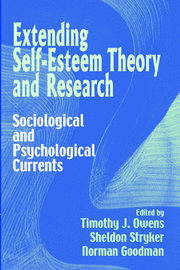Book contents
- Frontmatter
- Contents
- List of Contributors
- SECTION ONE THE FRAME
- SECTION TWO CONCEPTUAL AND METHODOLOGICAL ISSUES
- SECTION THREE SOCIAL AND LIFE COURSE CONTEXTS OF SELF-ESTEEM
- SECTION FOUR SELF-ESTEEM AND SOCIAL INEQUALITIES
- 11 Self-Esteem and Race
- 12 Gender and Self-Esteem: Narrative and Efficacy in the Negotiation of Structural Factors
- 13 Bereavement and the Loss of Mattering
- 14 Self-Esteem and Social Inequality
- 15 Self-Evaluation and Stratification Beliefs
- SECTION FIVE SELF-ESTEEM AND SOCIAL PROBLEMS
- Index
13 - Bereavement and the Loss of Mattering
Published online by Cambridge University Press: 24 November 2009
- Frontmatter
- Contents
- List of Contributors
- SECTION ONE THE FRAME
- SECTION TWO CONCEPTUAL AND METHODOLOGICAL ISSUES
- SECTION THREE SOCIAL AND LIFE COURSE CONTEXTS OF SELF-ESTEEM
- SECTION FOUR SELF-ESTEEM AND SOCIAL INEQUALITIES
- 11 Self-Esteem and Race
- 12 Gender and Self-Esteem: Narrative and Efficacy in the Negotiation of Structural Factors
- 13 Bereavement and the Loss of Mattering
- 14 Self-Esteem and Social Inequality
- 15 Self-Evaluation and Stratification Beliefs
- SECTION FIVE SELF-ESTEEM AND SOCIAL PROBLEMS
- Index
Summary
INTRODUCTION
Mattering is an important, albeit overlooked, component of self-concept. First specified by Rosenberg and McCullough (1981), it is potentially a powerful analytic tool. Rosenberg and McCullough viewed it as having multiple dimensions. First, it is based on one's understanding that he or she is the object of another's attentions. Individuals are not likely to harbor a sense of mattering to a person if they are not an object on whom that person focuses at least some attention. Moreover, in order for attention to contribute to the sense of mattering, the attention must be of a certain quality; specifically, it needs to convey the understanding that one is a valued and important object to the other. The sense of mattering is thus based on the individual's conviction that what he or she thinks, wants, or does is of salient concern to others.
A third dimension of mattering, central to the analysis presented in this chapter, is one's perception that others depend on her or him for something needed or wanted. The recognition that another person depends on us can be, according to Rosenberg and McCullough, a powerful reinforcement of mattering. As we will detail, the sense of mattering that stems from the knowledge that the satisfaction of the vital needs of another person depends on our assistance is a pivotal source of mattering in the population being studied here. We will show that the loss of that source can have deleterious consequences.
Information
- Type
- Chapter
- Information
- Extending Self-Esteem Theory and ResearchSociological and Psychological Currents, pp. 285 - 300Publisher: Cambridge University PressPrint publication year: 2001
Accessibility standard: Unknown
Why this information is here
This section outlines the accessibility features of this content - including support for screen readers, full keyboard navigation and high-contrast display options. This may not be relevant for you.Accessibility Information
- 38
- Cited by
